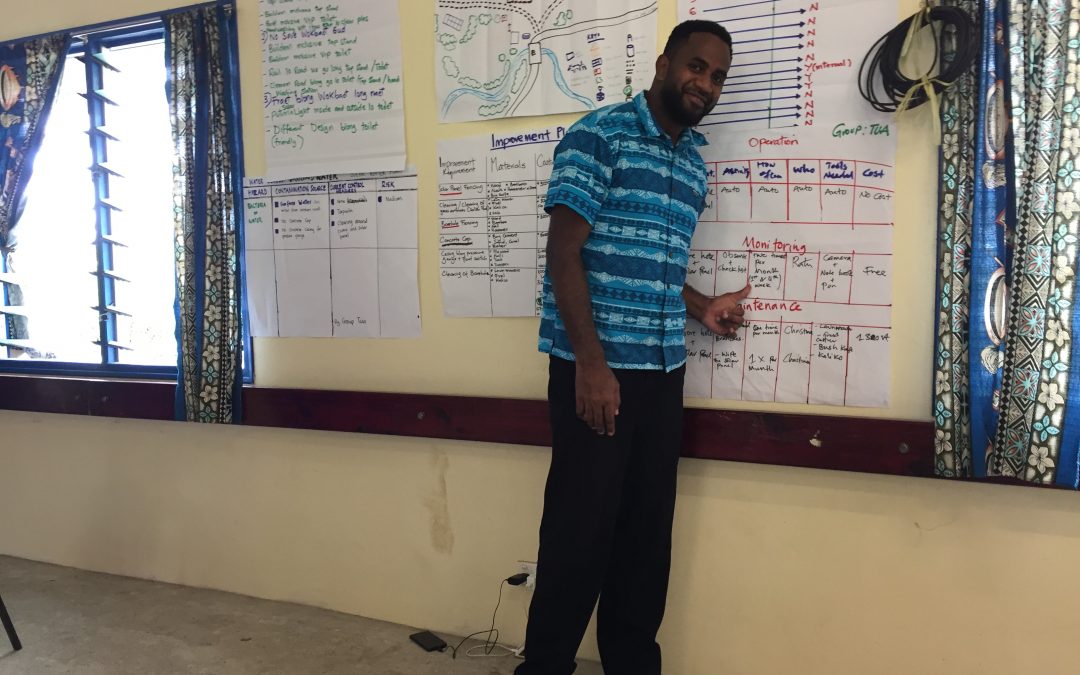Pictured: Ratu from Vanuatu’s Ministry of Health team at Drinking Water Safety and Security Plans training
Immediately following the COVID-19 pandemic crisis that has impacted the world, Vanuatu was hit by Category 5 Tropical Cyclone Harold. With borders closing in an urgent effort to curb the pandemic, it meant the arrival of any international humanitarian aid also immediately ceased. The Vanuatu Ministry of Health (MoH) needed to suddenly respond to two emergencies, simultaneously.
EWB Australia was already collaborating with Vanuatu’s MoH to help establish and roll-out the government’s Sanitation and Hygiene guidelines. COVID-19 amplified this urgency, as well as required updates to the guidelines to specifically address COVID-19. The Australian Volunteer Program has just announced the provision of much-needed additional funds to facilitate this work via it’s Impact Fund, and the work will commence immediately.
The Impact Fund aims to give provincial government staff the tools they need to share the latest COVID-19 related messages and national sanitation guidelines material, as well as training and awareness sessions, with their respective communities. The program will be delivered in two specific Provinces – Tafea and Malampa.
Tafea is located in the most southern of the six provinces of Vanuatu. It was selected because it is a key area of concern outside of Efate (the most populous island) due to its entry port and tourism, which may be at considerable risk of COVID-19 when the borders eventually reopen. Focusing on building the capacity of the Provincial Health and Local Administration teams will be key to mitigating this risk.
Malampa province is located in the very centre of Vanuatu and is home to some of the most remote communities, and also impacted by Tropical Cyclone Harold. Many villagers are as yet unaware of the best hygiene practices that are critical in addressing the spread of the COVID-19 pandemic.
Across both provinces, the initiatives aim to support a number of key stakeholders – village health workers, health zone nurses, members of the Aid Post Committee, and Area Secretaries of the Provincial Government.
Village Health Workers comprise community volunteers who operate as extension workers to deliver key health messages to their communities, with a focus on vulnerable groups such as the elderly, women, children and people with disabilities. As part of the program, this group will undertake training and receive the necessary materials to then disseminate official information related to COVID-19 as well as sanitation knowledge. The sanitation component of the training delivery will be supported remotely by EWB, providing planning and preparation of appropriate training material.
Planning for this program is critical to understand how the workshops can best reach and have the most impact for the vulnerable groups in these remote locations. These sessions will help participants identify the best way to have a maximum impact on vulnerable groups, through:
- Identifying barriers preventing the targeted vulnerable groups accessing the information (such as communication, physical, attitudes etc)
- Collecting available information in the two Provinces about what is known about people living with disabilities
- Determining suitable sites for delivering follow-up training into communities
- Seeking input from those vulnerable communities (such as people with disability and their representative organisations (Disabled People’s Organisations) on how to successfully deliver this support
EWB’s Vanuatu Program is supported by the Australian NGO Cooperation Program (ANCP), funded by the Australian Government, as well as the New Zealand Aid Programme.
To support EWB’s vital work like this for Vanuatu’s COVID-vulnerable communities and others in the Asia-Pacific region please donate at www.ewb.org.au/donate


